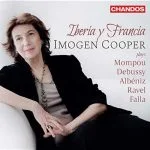

Composer: Isaac Albéniz, Carlo Domeniconi, Federico Mompou, Francisco Tárrega
Performer: Krzysztof Meisinger
Format: FLAC (tracks)
Label: Chandos
Catalogue: CHAN20278
Release: 2023
Size: 1.35 GB
Recovery: +3%
Scan: yes
01. Tárrega: Capricho árabe
02. Albéniz: Malagueña (No. 3 from Espana, Op. 165)
03. Albéniz: Prelude (No. 1 from Cantos de España, Op. 232)
Mompou: Suite Compostelana
04. I. Preludio
05. II. Coral
06. III. Cuna
07. IV. Recitativo
08. V. Canción
09. VI. Muñeira
Domeniconi: Variations after an Anatolian Folksong
10. Thema
11. Variation I
12. Variation II
13. Variation III
14. Variation IV
15. Variation V
16. Finale
Domeniconi: Koyunbaba, Op. 19
17. Invocazione (improvised Meisinger)
18. I. Moderato
19. II. Mosso
20. III. Cantabile
21. IV. Presto
22. V. Moderato (Tempo I) – Presto
Before a phrase from the Gran vals by Francisco Tárrega unexpectedly shot to international fame as the Nokia ringtone, his most celebrated pieces included the Capricho árabe, composed in 1892. The piece is inspired by the mixture of Muslim Castilian and Christian cultures which had always been a feature of the Valencia region where Tárrega grew up. Tárrega’s friend and near-contemporary Isaac Albéniz was a virtuoso pianist who also played the guitar. Even though he evoked the guitar brilliantly on the piano, he never composed any music for the instrument. ‘Malagueña’ was first published in the collection España. Published in 1892 as ‘Prélude’, the piece widely known as ‘Asturias’ is also imbued with the spirit of southern Spain. Federico Mompou’s Suite compostelana was commissioned by Andrés Segovia and was published in 1964, the same year as Segovia’s first recording of the piece. The Italian guitarist and composer Carlo Domeniconi has drawn on several national traditions for his works, but has a particular interest in Turkish music which he has studied in depth. The Variationen über ein anatolisches Volkslied (Variations on an Anatolian Folksong) were composed in 1982 and are based on the song (türkü) ‘Uzun ince bir yoldayim’. Koyunbaba is a four-movement suite for guitar which started as an improvisation, and was then notated soon afterwards. The composer describes the score as ‘no more than a sketch’ and insists that players improvise in their performance – which Krzysztof Meisinger does to great effect with his additional ‘Invocazione’ at the start of the work.



